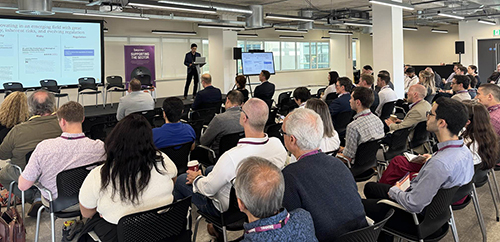The Inaugural BioAI Summit Kicks Off in Style!

The agenda covered a range of talking points, including the use of AI in R&D, pharma and regulatory and clinical practice; how to engage the public and keep them informed of the latest technological advances; a session on how the UK CEiRSI is revolutionising pharmaceutical and medical device development; and the applications of AI more widely within the sector.
Celebrating the launch of this event in style was a Life Science Mixer & BBQ kindly sponsored by Bruntwood SciTech, which saw conference attendees and Alderley Park tenants mix and mingle alongside whilst enjoying entertainment, food, bespoke cocktails and drinks, and a range of special activities.
Giving their perspectives on this growing sector, the three keynote speakers for this year’s conference were Dr Zili Zhou, Associate Principal AI Scientist at AstraZeneca; the University of Liverpool’s Professor of BioInfomatics, Andy Jones; and the UK CEiRSI Executive Director at the University of Manchester, Prof Alex Frangi.
The first keynote, “Graph AI in Drug Discovery”, examined the AI technique that leverages graph-based structures to model and analyse complex relationships in data, offering profound insights into interconnected systems, including interactions between proteins, gene-regulatory networks, and drug-target associations.
Discussing the biological and drug discovery benefits of using AI, it was noted that graph neural networks (GNNs) allowed the identification of shared biological pathways or targets that are relevant for both the compounds and the diseases in question, which could lead to a greater uptake in drug repurposing by identifying new indications, extending the drug lifecycle and reducing development costs.
The following presentation discussed the use of AI in computational biology, with key areas of life science research being facilitated by AI including natural language processing, automation, biomarker discovery and biomolecular modelling.
The main takeaways from this keynote included the potential for AI in big data fields; cautioning against the use of “simple” deployment of off-the-shelf AI solutions as it mostly leads to model failures in validation; the importance of optimal development of AI solutions requiring an interplay between domain and AI experts for life sciences; and opportunities for industry-academic partnerships in the field.
The final presentation of the day examined the UK CEiRSI and the imperatives behind in silico evidence in the digital era, with three key areas for ethical and innovative medical developmentbeing: ethical imperatives (reducing animal testing across the entire product lifecycle, aligning with broader ethical standards); innovative synergy (reducing animal testing to reduce patient harm, business risks and costs); and accelerated access (approaches speeding up the delivery of lifesaving therapies and interventions).
Conclusions from this presentation included the role of in-silico trials in revolutionising safety and speed in medical testing, with Computational Modelling and Simulation (CM&S) reshaping regulatory paths and driving innovation. It was also noted that virtual testing reduces development time, minimises risks, and enhances patient care, and as always, collaboration across sectors is key to regulatory evolution.
It was also acknowledged that in silico modelling has its challenges: namely that whilst computational modelling can augment other forms of evidence and provide unique insights, the identification of appropriate evidence for regulatory and market access early in the development process is crucial, as is checking that the evidence will be appropriate and acceptable to regulators, and the imperative to generate evidence that also supports market access and adoption.
Commenting on the success of the conference, Dr Geoff Davison, CEO of Bionow, said: “It was great to see our inaugural BioAI Summit come together so successfully, with innovators, thought leaders and stakeholders from across the biotech and AI sectors sharing their experience. The panel discussions sparked great conversations about how AI is changing R&D, clinical practice, and regulations, and how we can better engage the public in these advancements. It was great to highlight the work of the UK CEiRSI and explore all the ways AI is shaping the future of healthcare, and the networking sessions really showed how much potential there is for collaboration. It’s an exciting step forward for the sector.”
The 2025 BioAI Summit is supported by Appleyard Lees and Bruntwood SciTech.





















